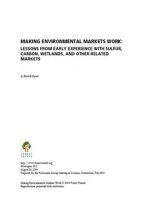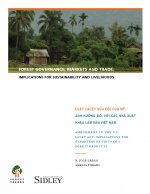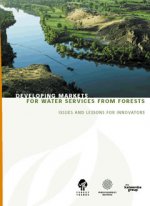Making Environmental Markets Work
Lessons from Early Experience with Sulphur, Carbon, Wetlands, and Other Related Markets
By Ricardo Bayon - Forest TrendsEver since the passage of the 1990 amendments to the US Clean Air act and the creation of a market in sulfur dioxide (SO2), it has become clear that market mechanisms can be effectively used to achieve environmental policies. But markets are neither infallible nor automatic. They have blind spots and they need to be […]
Who Owns the World’s Forests? Forest Tenure and Public Forests in Transition
By Andy White, and Alejandra Martin - Forest Trends, Forest Trends, Center for International Environmental LawSince the late 1980s, some governments of major forested countries have begun to reconsider and reform forest ownership policies. These transitions are driven by three primary considerations. First, governments are increasingly aware that official forest tenure systems in many countries discriminate against the rights and claims of indigenous people and other local communities. Although the […]
Amendment To The U.S. Lacey Act:
Implications For Vietnamese Forest Products Exporters
By Juge Gregg, Amelia Porges - Sidley Austin LLP, Sidley Austin LLP, Forest TrendsA new law gives the U.S. government the power to fine, and even jail, individuals and companies who traffic in illegally harvested wood products. The U.S. government can even use this law, called the Lacey Act, to impose significant penalties on individuals and companies who do not realize that their wood is tainted. This new […]
Dependent Documents
Điều chỉnh Đạo luật Lacey của Hoa Kỳ
Ý nghĩa đối với các đơn vị xuất khẩu lâm sản của Việt Nam
By R. Jude Gregg, Amelia Porges - Sidley Austin LLP, Sidley Austin LLP, Forest TrendsEmail Signup
Subscribe to any of Forest Trends’ mailing lists to keep up with the news, publications, and events that interest you.
Having Trouble?
If you experience any technical difficulties on our site, please contact Genevieve Bennett, Communications Manager.
Making Markets Work for Forest Communities
By Sara J. Scherr, Andy White, and David Kaimowitz - Forest Trends, Forest Trends, Center for International Forestry ResearchDevelopment assistance efforts in recent years have focused on forests as “safety nets” for low-income forest dwellers. These efforts emphasize access to forest resources for the poor to meet their subsistence needs. But much less has been done to help local people exploit their forest assets in a sustainable manner to take advantage of the […]
Siberian and Russian Far East Timber for China
Legal and Illegal Pathways, Players and Trends
By Anatoly Lebedev - Bureau for Regional Outreach Campaigns, Forest Trends, CIFOR, DFIDThe preservation and sustainable use of Siberian and Russian Far East (RFE) forests is of global importance for a number of reasons. These forests, which are the traditional environments of many endangered species and indigenous tribes, are now supplying timber to nearby regions and countries that have largely destroyed their own forests. The vast forests […]
A Brief Overview of China’s Timber Market
By Xiufang Sun, Liqun Wang, Zhenbin Gu - Forest Trends, School of Economics and Management at Beijing Forestry University, School of Economics and Management at Beijing Forestry University, Chinese Center for Agricultural Policy, CIFOR, CEM, Beijing Forestry University, DFIDChina’s timber market has undergone dramatic changes in recent decades and continues to change rapidly. Currently, timber producers are allowed to market their timber directly to different buyers, although timber harvest and transport remain heavily regulated by the government. China’s primary wood-processing industry and wood-consuming sectors have experienced rapid growth in recent years. Sectors like […]
Forest Governance in Federal Systems
An Overview of Experiences and Implications for Decentralization
By Hans Gregersen, Arnoldo Contreras-Hermosilla, Andy White, Lauren Phillips - CGIAR, Forest Trends, Forest Trends, Forest Trends, United Nations Forum on Forests, CIFOR, Inter Cooperation, SDCInternationally recognized problems such as illegal logging and uncontrolled deforestation, as well as the broader political trends, are driving many countries to reconsider centralized systems of decision-making and direct government implementation of forest programs. The paper assesses the experiences of eight countries with federal systems including Australia, Brazil, Canada, India, Malaysia, Nigeria, Russia, and the […]
Logging, Legality and Livelihoods in Papua New Guinea
Synthesis of Official Assessments of the Large-Scale Logging Industry Volume II
By Forest TrendsBetween 2000 and 2005, in response to a widely held view that forest management in Papua New Guinea was not providing long-term benefits to the country or its citizens, and to assess the implementation and effectiveness of the new governance regime introduced in the PNG Forestry Act of 1991, the Papua New Guinea government commissioned […]
Developing Future Ecosystem Service Payments In China
Lessons Learned from International Experience
By Sara J. Scherr, Michael T. Bennett, Molly Loughney, Kerstin Canby - Ecoagriculture Partners, Peking University College of Environmental Sciences, Forest Trends, Forest Trends, PROFORAcross the world, the growing scarcity of ecosystem services has led to a flurry of conservation innovations over the past decade in the form of payment schemes and nascent markets for these services. The global economic value of ecosystem services is estimated in the trillions of dollars, though actual payments for protecting these services are […]
Developing Markets for Water Services from Forests
Issues and Lessons for Innovators
Of the many services that forests provide, hydrological services, such as water quality and water flow, are among the most valuable. As we look ahead into the next decade, water will become an increasingly critical issue as it becomes an increasingly scarce resource. The value of these hydrological services will only grow over time. Policy […]











